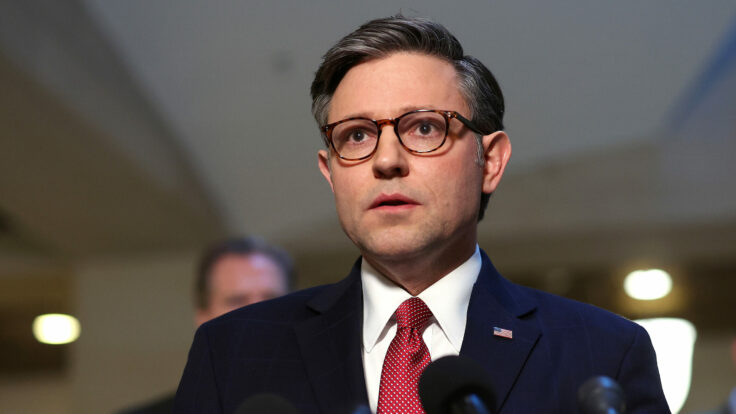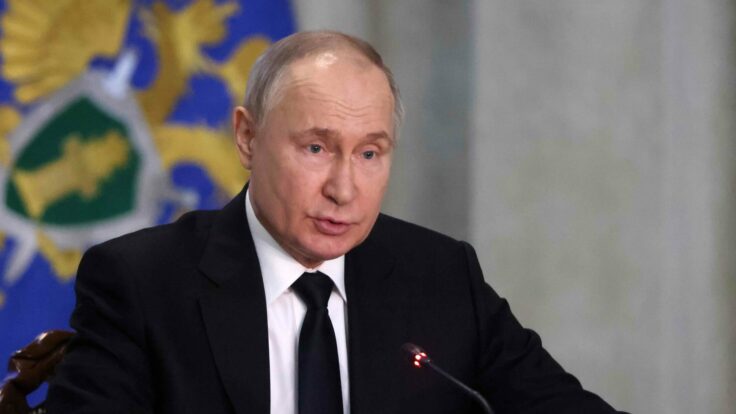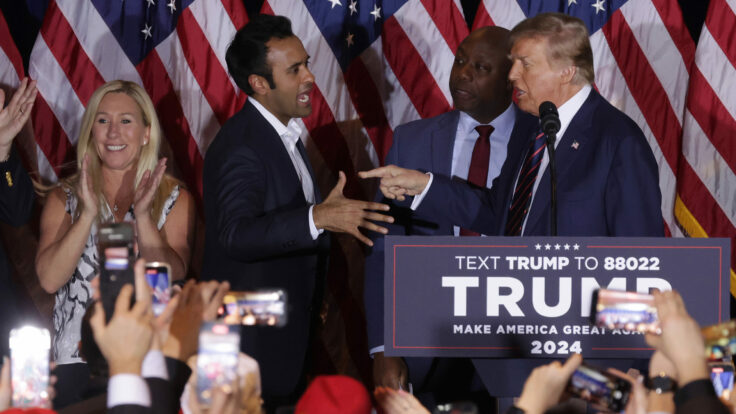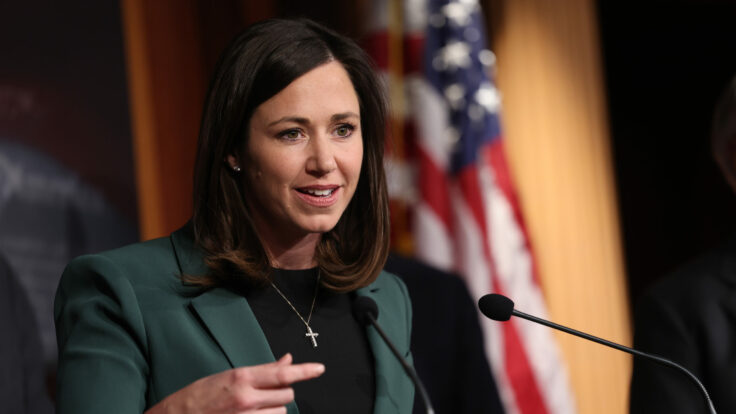The official theme at this year’s Munich Security Conference, an annual gathering of the who’s who of the trans-Atlantic community’s national security elite—current and former heads of state, foreign ministers and ministers of defense, generals, congressional delegations (CODELs), think tankers, activists, journalists, hangers on—was, you guessed it, “Zeitenwende on Tour.” Zeitenwende, one of those nifty German turns of phrase capable of folding a complex concept into a single word, means “the end of an era,” and it refers to the speech that German Chancellor Olaf Scholz gave to the Bundestag three days after Russia’s invasion of Ukraine.
Under his predecessor Angela Merkel, Germany had weaved a thick web of economic cooperation with Russia in the hopes of bringing the country into the Western community and away from its former Cold War antagonism. On February 24, 2022, that era had ended. Germany, after its horrifying crimes in World War II, had developed a healthy allergy for militarism and stubbornly resisted every American president’s efforts to get their country to spend two percent of their military budget on defense, as required by NATO. That era too had ended. Scholz, who in the run-up to the invasion had tried to help Vladimir Putin find a new off-ramp every time the Russian president blew past another one, was now on the side of arming Ukraine. A year after the Zeitenwende speech, Germany was sending Leopard tanks to Kyiv.
If that old era cooperation, however uneasy and fraught, was over, what had replaced it? The speeches and panels at this year’s conference insisted that it was trans-Atlantic unity and resolve. Speaker after speaker, from Scholz to Emmanuel Macron, Rishi Sunak, and Kamala Harris, pledged their country’s unwavering commitment to Ukraine in its struggle to defeat Russia. Some egged on their allies to do more, like the German defense minister, who said two percent should be not the ceiling but the floor for NATO countries’ military spending. If you listened to the official proceedings, either from the Hotel Bayerischer Hof or via the live stream, you would come away believing that Ukraine was in good hands and that the Western commitment to its victory was ironclad, even if the war dragged on for years, a possibility which the conference’s participants were now openly acknowledging.
But why come to Munich to listen to the speeches? The real talk happens elsewhere, at the myriad private breakfasts and lunches and dinners, at the afterparties in restaurants just outside the intense security perimeter or in the Hof’s baroque lobby bar, where you can catch Kyiv mayor and former professional boxer Vitali Klitschko talking shit about Volodymyr Zelensky (he is so obsessed with loyalty, Klitschko joked ruefully, that members of his team need to ask him permission to go out to dinner). It happens at Trader Vic’s, the tiki joint in the basement where Cindy McCain threw a party for the various CODELs (four of them this time!) and where I spotted Lindsey Graham holding court from an ornate wicker throne. That’s where people really say what’s on their minds—and it was hardly unity.
One evening at Schumann’s Bar, for instance, Mark Warner, head of the Senate Intelligence Committee, got up on a chair to address a cocktail party that included a NATO undersecretary, various Europeans, and a handful of American senators, and tried to reassure “our European allies.” “Don’t worry,” he said, trying to make sure everyone could see and hear him. “The voices on the American right are very loud but they don’t set policy.” The center, he assured America’s European allies, would hold.
“A Long War Is a Disaster”
On his way out of the party and onto another dinner, the gravelly-voiced Warner told me not to make too much of it. Our European partners weren’t all that worried and they knew America’s commitment was solid. They understood that American democracy was what it was and they certainly weren’t thinking as far ahead as 2024, when Joe Biden will, in all likelihood, run again. Nothing to see here, essentially. But if no one was worried, why get up on a chair and tell everyone not to worry?
At a dinner later that night held under Chatham House rules, three Republican legislators swore to everyone at the table, which included several Ukrainians, that the members of their caucus who threatened to slash aid to Ukraine did not speak for their party—and they would not win. These three G.O.P. legislators, one after the other affirmed, getting red in the face or slamming a hand on the table, swore that they would do their all to help Ukraine and they would “die on this hill.”
Afterwards, I ran into one of the Ukrainians, Hanna Hopko, a former parliamentarian, at the Hof bar, where the night owls were still gossipping and talking shop. She was furious. Her country was in ruins. She had lost dozens of friends. She hadn’t seen her daughter more than a couple of times in the last year, but all the talk was of a long war in Ukraine. “A long war is a disaster for us!” Hopko nearly shouted. “A disaster!” How much longer could Ukraine survive in a war that had destroyed its economy, killed tens of thousands of civilians, displaced millions, and, as the Estonian minister of defense told me, racked up a quarter million dead and wounded soldiers? Sure, the Russians had similar numbers, but they had a far larger pool to draw from. Oleksiy Goncharenko, a member of the Ukrainian parliament representing Odessa, told me grimly that Ukraine was facing a real manpower shortage. There were no more volunteers, he said. The ones who had joined up a year ago were dead, and there were no new ones queueing up to take their place.
At the bar, Hopko was equal parts furious and desperate. The security conference was all empty rhetoric, she said. It resulted in no new promises of military aid. Ukraine had been lobbying hard for jets, but every single Western leader gingerly sidestepped the issue. “They are giving us enough not to lose, but they are not giving us enough to win,” she said. And in a long war, that meant only one thing for Ukraine: defeat.
Exit Ramps?
The longer I was in Munich, the more I understood some people’s private confusion with the Biden administration’s line on Ukraine. While in flight to Munich, Politico’s Alex Ward and Paul McLeary typed up a story that Alex got while waiting to board the plane with half of D.C.’s foreign policy establishment. On a phone call with the city’s think tankers, Secretary of State Antony Blinken had said that Crimea is Putin’s red line and that the United States was conveying to the Ukrainians that making a push to retake the peninsula militarily wouldn’t be wise. “Overall the message is that there is a lot of uncertainty on how things will go from here with real questions about capacity of either side to make big gains,” one of the people on the call told Alex and Paul.
A few days before the conference, a senior administration official told the Washington Post that, given the political realities in D.C., more aid might be harder and harder to come by. The Boeberts and Greenes and Gaetzes in Congress aren’t just very loud, they have a fair bit of power in a House where their party has the slimmest of majorities. “‘As long as it takes’ pertains to the amount of conflict,” an anonymous White House official told the Post. “It doesn’t pertain to the amount of assistance.” The official stressed that, “We will continue to try to impress upon them that we can’t do anything and everything forever.”
In November, the White House had to publicly distance itself from Joint Chiefs chairman General Mark Milley’s comments that, given the state of the battlefield, Ukraine was unlikely to achieve its aims—restoring its 1991 borders—militarily. It was time to start talking about talking. Now, three months later, it seems that the White House is starting to come around to Milley’s position, at least more publicly. And since we’re talking about big concepts that fit into one German word, there’s a fair bit of schadenfreude in the Milley camp, though I don’t know the German word for the bitterness they feel at being hung out to dry when they believe everyone basically agreed with Milley even then.
“Everyone here is talking about exit ramps, but very, very quietly, just nibbling around the edges,” one high-profile American conference attendee told me. “You’ll get slammed if you say anything publicly. You have to maintain a public front of unity.” But the talk of exit ramps was there, only one year in. I asked this attendee what was really happening under the happy talk of a unified front. “There’s a lot of uncertainty and a feeling that time is not on Ukraine’s side,” they responded, in part because of political uncertainty in the U.S. and the understanding that Europe still needed Washington to be its cat-herder. “Without the U.S., does the E.U. hold together on Ukraine? Yes, but not at the same levels. Does Ukraine collapse [if aid levels decrease without the U.S.]? Probably. And Putin knows that. He’s waiting us out.”
I could see why Hopko was so angry at the divergence between what Western leaders declared publicly and what they said privately. There were a couple off the record events I went to, so I can’t say who they were with, but the distinct sense I was starting to get from them and as I left Munich was that for all the talk of “nothing about Ukraine without Ukraine,” the West was fundamentally not comfortable helping Ukraine to win on Ukraine’s terms. There was a very realistic and accurate assessment that Putin’s nuclear threats were not empty and that he very well might act on them if the Russian military collapsed or if Ukrainians took Crimea. That is, Putin would go nuclear if Ukraine won the war.
Putin has made this war existential. He cannot lose it and survive as the leader of Russia. At that point, everything is on the table, and given my conversations with Moscow, that still very much includes a potential tactical nuclear strike on the battlefield. That, from everything I’ve heard in my conversations with people in the Biden administration, would force the United States to get directly involved. Does that mean that the U.S. and Europe can’t let Russia lose and Ukraine win?
We’re very far from that on the ground, where the fight is still very much a World War I-esque stalemate, but I’m not the only one in Washington asking this question: Does the Biden administration want Ukraine to win on Ukraine’s terms, and will it help Ukraine to do so? I don’t know that anyone, Ukrainians included, left Munich with a good answer. Nor do I know that, at the moment, the Biden administration has an answer to give. What I do know is that Putin is very well aware of that.

















